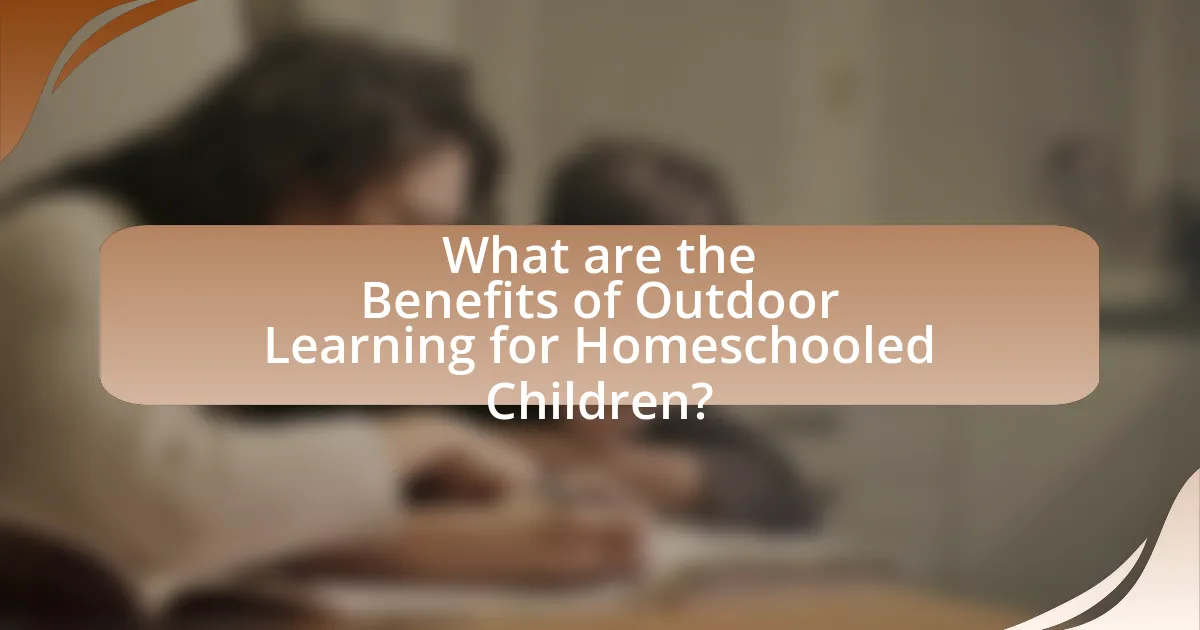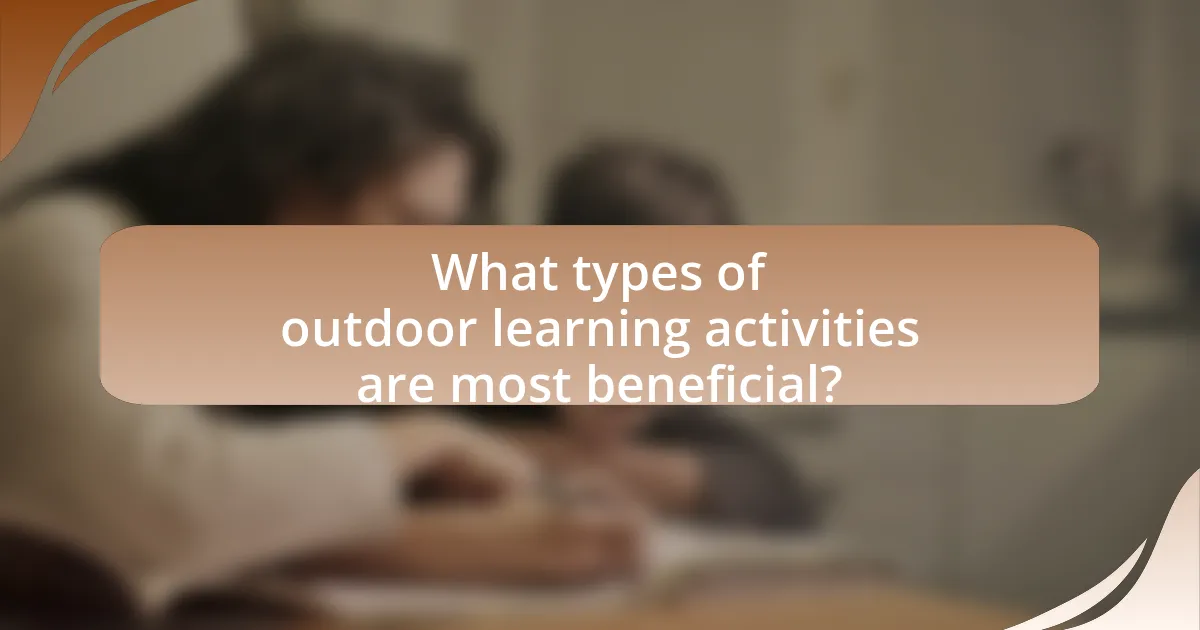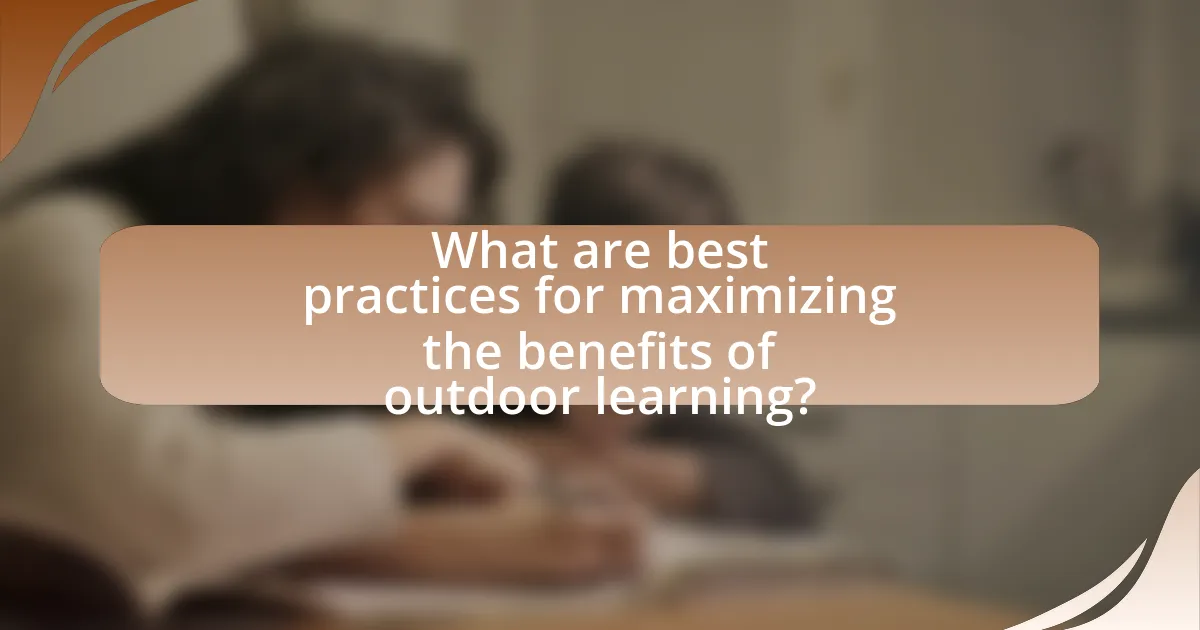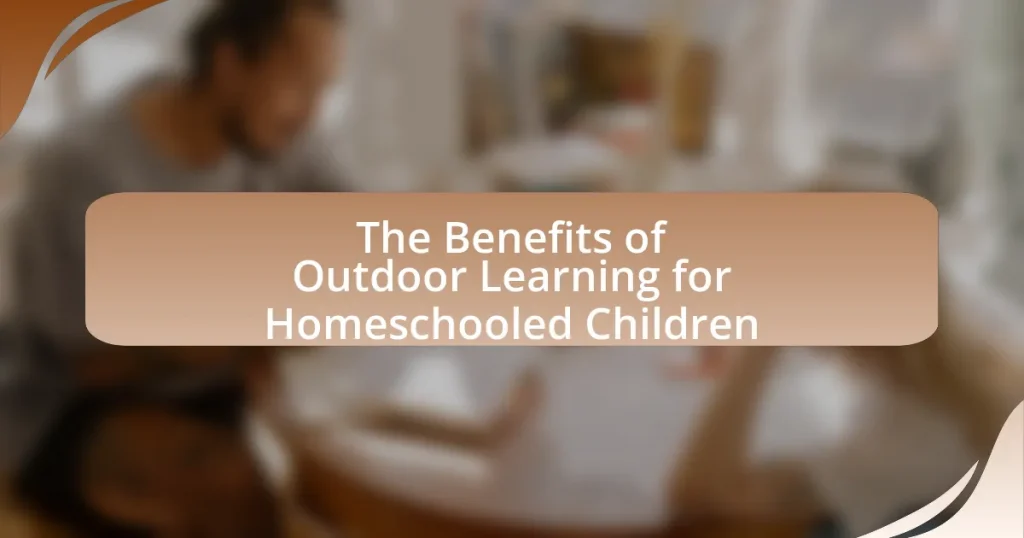The article focuses on the benefits of outdoor learning for homeschooled children, highlighting its positive impact on physical health, cognitive development, and social skills. It discusses how outdoor learning enhances educational experiences through hands-on activities that promote engagement and retention of knowledge. Key skills developed through outdoor learning include critical thinking, problem-solving, teamwork, and communication. The article also addresses the emotional benefits, such as increased self-esteem and reduced anxiety, while providing practical suggestions for parents to implement outdoor learning effectively in their homeschooling curriculum. Additionally, it explores the role of nature in cognitive development and the importance of creating safe, engaging outdoor environments for learning.

What are the Benefits of Outdoor Learning for Homeschooled Children?
Outdoor learning provides numerous benefits for homeschooled children, including enhanced physical health, improved cognitive development, and increased social skills. Engaging in outdoor activities promotes physical fitness, as children are more likely to participate in active play, which can reduce obesity rates and improve overall health. Research indicates that outdoor learning environments stimulate cognitive functions, leading to better retention of information and increased creativity. Additionally, outdoor settings encourage collaboration and communication among peers, fostering essential social skills. A study published in the Journal of Adventure Education and Outdoor Learning found that children who engage in outdoor learning experiences demonstrate higher levels of engagement and motivation in their studies.
How does outdoor learning enhance educational experiences for homeschooled children?
Outdoor learning enhances educational experiences for homeschooled children by providing hands-on, experiential learning opportunities that foster engagement and retention of knowledge. Research indicates that outdoor environments stimulate curiosity and creativity, allowing children to explore subjects like science and geography in real-world contexts. For instance, a study published in the Journal of Adventure Education and Outdoor Learning found that students who participated in outdoor learning activities demonstrated improved problem-solving skills and greater enthusiasm for learning compared to their peers in traditional classroom settings. This evidence supports the notion that outdoor learning not only enriches the educational experience but also promotes holistic development in homeschooled children.
What specific skills can children develop through outdoor learning?
Children can develop critical thinking, problem-solving, teamwork, and communication skills through outdoor learning. Engaging in outdoor activities encourages children to analyze their environment, make decisions based on observations, and collaborate with peers to achieve common goals. Research indicates that outdoor learning experiences enhance cognitive development and social skills, as children often face real-world challenges that require innovative solutions and effective interaction with others. For instance, a study published in the Journal of Adventure Education and Outdoor Learning found that children participating in outdoor education programs showed significant improvements in teamwork and leadership abilities compared to those in traditional classroom settings.
How does outdoor learning impact children’s social interactions?
Outdoor learning significantly enhances children’s social interactions by providing opportunities for collaborative play and teamwork. Engaging in outdoor activities fosters communication skills, as children must express their ideas and negotiate roles during group tasks. Research indicates that children participating in outdoor learning environments exhibit improved social skills, such as empathy and cooperation, compared to those in traditional classroom settings. A study published in the Journal of Adventure Education and Outdoor Learning found that outdoor education programs lead to increased social competence among participants, highlighting the positive correlation between outdoor experiences and social interaction development.
Why is outdoor learning important for holistic development?
Outdoor learning is important for holistic development because it fosters physical, emotional, social, and cognitive growth in children. Engaging with nature enhances physical health through activities that promote fitness and coordination, while also reducing stress and anxiety levels. Socially, outdoor learning encourages collaboration and communication among peers, which builds teamwork skills and emotional intelligence. Cognitively, exposure to diverse environments stimulates curiosity and critical thinking, leading to improved problem-solving abilities. Research by the University of Illinois found that children who participate in outdoor learning experiences show increased attention spans and better academic performance, reinforcing the significance of outdoor settings in comprehensive child development.
What role does nature play in cognitive development?
Nature plays a crucial role in cognitive development by providing diverse stimuli that enhance learning and brain function. Exposure to natural environments has been shown to improve attention, memory, and problem-solving skills in children. Research indicates that outdoor learning experiences can lead to increased creativity and critical thinking, as children engage with their surroundings in a hands-on manner. For instance, a study published in the journal “Frontiers in Psychology” by Faber Taylor and Kuo found that children who spend time in nature exhibit better cognitive functioning and emotional well-being compared to those who do not. This evidence underscores the importance of integrating nature into educational practices to foster cognitive growth in children.
How does outdoor learning contribute to physical health?
Outdoor learning significantly contributes to physical health by promoting increased physical activity among participants. Engaging in outdoor activities such as hiking, gardening, or sports leads to improved cardiovascular fitness, muscle strength, and overall physical endurance. Research indicates that children who spend more time outdoors are more likely to meet recommended physical activity levels, which is essential for maintaining a healthy weight and reducing the risk of obesity-related diseases. For instance, a study published in the Journal of Environmental Psychology found that children who participated in outdoor learning programs exhibited higher levels of physical activity compared to those in traditional indoor settings, highlighting the direct link between outdoor learning and enhanced physical health outcomes.
What are the emotional benefits of outdoor learning for homeschooled children?
Outdoor learning provides significant emotional benefits for homeschooled children, including enhanced self-esteem, reduced anxiety, and improved social skills. Engaging with nature allows these children to experience a sense of freedom and autonomy, which fosters confidence in their abilities. Research indicates that outdoor environments can lower stress levels; for instance, a study published in the Journal of Environmental Psychology found that exposure to natural settings can lead to decreased feelings of anxiety and increased mood levels. Additionally, outdoor learning often involves collaborative activities, which promote social interaction and help develop communication skills, further contributing to emotional well-being.
How does outdoor learning foster resilience and confidence?
Outdoor learning fosters resilience and confidence by providing children with opportunities to face challenges in a dynamic environment. Engaging in activities such as hiking, team-building exercises, and problem-solving tasks outdoors encourages children to step out of their comfort zones, which builds their ability to cope with adversity. Research indicates that children who participate in outdoor learning experiences demonstrate increased self-efficacy and adaptability, as they learn to navigate unpredictable situations. For instance, a study published in the Journal of Adventure Education and Outdoor Learning found that outdoor education programs significantly enhance students’ resilience and confidence levels, as they develop skills to overcome obstacles and work collaboratively with peers.
What impact does outdoor learning have on stress and anxiety levels?
Outdoor learning significantly reduces stress and anxiety levels in children. Research indicates that exposure to natural environments can lower cortisol levels, a hormone associated with stress. A study published in the Journal of Environmental Psychology found that children who participated in outdoor learning activities reported lower levels of anxiety and improved mood compared to those engaged in traditional classroom settings. Additionally, outdoor learning fosters social interaction and physical activity, both of which contribute to enhanced emotional well-being.
How can parents effectively implement outdoor learning in their homeschooling curriculum?
Parents can effectively implement outdoor learning in their homeschooling curriculum by integrating nature-based activities that align with educational goals. This can include organizing field trips to parks, nature reserves, or botanical gardens, where children can engage in hands-on learning experiences related to science, geography, and environmental studies. Research indicates that outdoor learning enhances cognitive development and improves academic performance; for instance, a study published in the Journal of Environmental Education found that students participating in outdoor education programs showed a 27% increase in science test scores compared to their peers in traditional classroom settings. Additionally, parents can incorporate outdoor projects such as gardening or nature journaling, which foster creativity and critical thinking skills while connecting children with their environment.
What challenges might parents face when incorporating outdoor learning?
Parents may face logistical challenges when incorporating outdoor learning, such as finding suitable locations and managing transportation. These challenges can hinder the frequency and quality of outdoor educational experiences. Additionally, parents might struggle with safety concerns, including potential hazards in natural environments, which can lead to anxiety about their children’s well-being. Research indicates that 70% of parents express worry about outdoor safety, impacting their willingness to engage in outdoor learning activities. Furthermore, parents may encounter difficulties in aligning outdoor learning with educational standards or curricula, making it challenging to ensure that learning objectives are met.

What types of outdoor learning activities are most beneficial?
Outdoor learning activities that are most beneficial include nature walks, gardening, outdoor science experiments, and team-building games. Nature walks enhance observational skills and foster a connection with the environment, while gardening teaches responsibility and the science of ecosystems. Outdoor science experiments, such as studying weather patterns or plant growth, provide hands-on learning experiences that reinforce scientific concepts. Team-building games promote social skills and cooperation among children. Research indicates that outdoor learning can improve academic performance and emotional well-being, as evidenced by a study published in the Journal of Environmental Education, which found that students engaged in outdoor learning showed increased motivation and engagement in their studies.
How do different outdoor environments contribute to learning?
Different outdoor environments enhance learning by providing diverse sensory experiences, promoting engagement, and fostering social interaction. Natural settings, such as parks and forests, stimulate curiosity and exploration, which are essential for experiential learning. Research indicates that children who learn in outdoor environments demonstrate improved focus, creativity, and problem-solving skills. For instance, a study published in the Journal of Environmental Education Research found that students participating in outdoor learning programs showed a 27% increase in science test scores compared to their peers in traditional classrooms. This evidence underscores the significant impact that varied outdoor environments have on educational outcomes.
What are the advantages of forest schools for homeschooled children?
Forest schools offer numerous advantages for homeschooled children, primarily enhancing their learning experiences through immersive outdoor education. These programs promote hands-on learning, allowing children to engage with nature, which has been shown to improve cognitive development and foster creativity. Research indicates that outdoor learning environments can lead to increased motivation and better retention of information, as children are more likely to engage with subjects when they can explore them in a real-world context. Additionally, forest schools encourage social skills and teamwork, as children often work collaboratively on projects and activities, enhancing their communication abilities and emotional intelligence. Studies have demonstrated that children who participate in outdoor education programs exhibit lower levels of stress and anxiety, contributing to overall well-being and a positive attitude toward learning.
How can urban settings be utilized for outdoor learning?
Urban settings can be utilized for outdoor learning by transforming public spaces, such as parks, community gardens, and urban farms, into interactive classrooms. These environments provide hands-on experiences that enhance educational engagement and foster a connection to the community. For instance, studies show that outdoor learning in urban areas can improve students’ observational skills and critical thinking, as they engage with real-world scenarios. Additionally, urban settings often feature diverse ecosystems and cultural landmarks, which can enrich the curriculum by incorporating local history and environmental science.
What specific outdoor activities promote learning and development?
Specific outdoor activities that promote learning and development include nature walks, gardening, and outdoor science experiments. Nature walks enhance observational skills and foster an appreciation for the environment, while gardening teaches responsibility, biology, and nutrition. Outdoor science experiments, such as studying ecosystems or weather patterns, encourage critical thinking and hands-on learning. Research indicates that outdoor learning experiences can improve cognitive skills and social interactions, as highlighted in the study “The Impact of Outdoor Learning on Children’s Learning and Development” by the University of Edinburgh, which found that children engaged in outdoor activities showed increased engagement and improved academic performance.
How can nature walks enhance observational skills?
Nature walks enhance observational skills by encouraging individuals to engage with their surroundings actively. During these walks, participants learn to notice details such as plant species, animal behaviors, and environmental changes, which sharpens their ability to observe and interpret visual information. Research indicates that outdoor experiences significantly improve attention and focus, as evidenced by a study published in the Journal of Environmental Psychology, which found that spending time in nature can lead to a 20% increase in attention span. This heightened awareness fosters critical thinking and analytical skills, essential components of effective observation.
What role do outdoor games play in teamwork and collaboration?
Outdoor games significantly enhance teamwork and collaboration by fostering communication, trust, and problem-solving skills among participants. Engaging in these activities requires players to work together towards a common goal, which cultivates a sense of unity and shared responsibility. Research indicates that outdoor games, such as team sports, improve social interactions and encourage individuals to rely on one another, thereby strengthening group dynamics. For instance, a study published in the Journal of Adventure Education and Outdoor Learning found that children participating in outdoor team activities exhibited increased cooperation and improved conflict resolution skills. This evidence underscores the vital role outdoor games play in developing essential teamwork and collaboration abilities.
How can outdoor learning be integrated with academic subjects?
Outdoor learning can be integrated with academic subjects by utilizing nature as a dynamic classroom that enhances experiential learning. For instance, science lessons can be taught through hands-on activities like observing ecosystems, conducting experiments with soil samples, or studying plant biology in a garden setting. Mathematics can be applied in real-world contexts, such as measuring distances during a nature hike or calculating the area of a garden plot. Language arts can be enriched by encouraging students to write descriptive essays about their outdoor experiences or engage in storytelling sessions in natural settings. Research indicates that outdoor learning not only improves engagement but also enhances retention of information, as evidenced by a study published in the Journal of Environmental Education Research, which found that students participating in outdoor education scored higher on assessments related to the subjects taught outdoors.
What are effective ways to teach science through outdoor exploration?
Effective ways to teach science through outdoor exploration include hands-on experiments, nature walks, and field studies. Hands-on experiments allow students to engage directly with scientific concepts, such as observing plant growth or conducting water quality tests in local streams. Nature walks facilitate the observation of ecosystems, enabling students to identify species and understand their roles in the environment. Field studies provide opportunities for in-depth investigation of specific scientific questions, such as studying soil composition or weather patterns. Research indicates that outdoor learning enhances student engagement and retention of scientific knowledge, as evidenced by a study published in the Journal of Environmental Education, which found that students participating in outdoor science programs showed a 20% increase in science test scores compared to those in traditional classroom settings.
How can outdoor learning support literacy and creative writing?
Outdoor learning enhances literacy and creative writing by providing immersive experiences that stimulate imagination and language development. Engaging with nature allows children to observe, describe, and narrate their surroundings, fostering vocabulary expansion and narrative skills. Research indicates that outdoor environments can increase motivation and engagement in writing activities, as children draw inspiration from real-world contexts. For instance, a study by the University of Exeter found that outdoor learning significantly improved students’ writing skills, as they were more likely to express their thoughts creatively when inspired by their environment.

What are best practices for maximizing the benefits of outdoor learning?
To maximize the benefits of outdoor learning, educators should integrate structured activities that promote exploration, critical thinking, and collaboration. Research indicates that outdoor learning enhances cognitive development and engagement; for instance, a study by the University of Illinois found that children who participated in outdoor education showed improved focus and academic performance. Additionally, incorporating hands-on experiences, such as nature walks and environmental projects, fosters a deeper understanding of ecological concepts and encourages physical activity, which is essential for overall health. Creating a supportive environment that encourages curiosity and inquiry further amplifies the positive impacts of outdoor learning.
How can parents create a safe and engaging outdoor learning environment?
Parents can create a safe and engaging outdoor learning environment by establishing clear boundaries, ensuring proper supervision, and incorporating diverse learning activities. Setting boundaries involves designating specific areas for play and learning, which helps children understand where they can explore safely. Supervision is crucial; parents should actively monitor their children to prevent accidents and provide guidance during activities. Additionally, incorporating a variety of learning activities, such as nature walks, gardening, and outdoor science experiments, fosters engagement and curiosity. Research indicates that outdoor learning enhances children’s cognitive development and social skills, making it a valuable approach for homeschooling.
What safety measures should be taken during outdoor activities?
Safety measures during outdoor activities include wearing appropriate clothing and gear, staying hydrated, and being aware of the environment. Wearing suitable clothing protects against weather conditions, while proper gear, such as helmets for biking or climbing, reduces injury risk. Staying hydrated is crucial, as dehydration can impair physical performance and cognitive function. Awareness of the environment involves understanding potential hazards, such as wildlife, terrain, and weather changes, which can prevent accidents. According to the National Safety Council, proper preparation and awareness significantly reduce the likelihood of injuries during outdoor activities.
How can parents encourage exploration and curiosity in outdoor settings?
Parents can encourage exploration and curiosity in outdoor settings by providing opportunities for unstructured play and hands-on experiences. Research indicates that children learn best through active engagement with their environment, which fosters critical thinking and problem-solving skills. For instance, allowing children to explore natural areas, such as parks or gardens, without a strict agenda promotes their innate curiosity and encourages them to ask questions about their surroundings. Additionally, parents can facilitate this exploration by asking open-ended questions, which stimulates children’s thinking and encourages them to investigate further. Studies show that children who engage in outdoor play exhibit increased creativity and cognitive development, reinforcing the importance of outdoor learning experiences.
What resources are available to support outdoor learning for homeschooled children?
Resources available to support outdoor learning for homeschooled children include nature-based curricula, local parks and nature centers, online platforms offering outdoor education materials, and community programs focused on environmental education. Nature-based curricula, such as the “Nature Explore Classroom” initiative, provide structured activities that promote outdoor learning. Local parks and nature centers often offer workshops and guided activities tailored for homeschoolers, enhancing experiential learning. Online platforms like “Outdoor Classroom Project” provide resources and lesson plans that encourage outdoor exploration. Additionally, community programs, such as those offered by 4-H or local environmental organizations, facilitate hands-on learning experiences in natural settings. These resources collectively foster a rich outdoor learning environment for homeschooled children.
What community programs can enhance outdoor learning experiences?
Community programs that can enhance outdoor learning experiences include nature-based education initiatives, local environmental stewardship projects, and outdoor adventure clubs. Nature-based education initiatives, such as those offered by organizations like the National Wildlife Federation, provide structured outdoor learning opportunities that focus on ecology and conservation, fostering a connection to nature. Local environmental stewardship projects, often organized by community groups or non-profits, engage children in hands-on activities like tree planting or habitat restoration, which not only teach ecological principles but also promote teamwork and responsibility. Outdoor adventure clubs, which may be run by schools or community centers, offer activities such as hiking, camping, and wildlife observation, encouraging physical activity and exploration while enhancing social skills and confidence in outdoor settings. These programs collectively support the development of critical thinking, teamwork, and a deeper appreciation for the environment among homeschooled children.
How can technology be used to complement outdoor learning?
Technology can complement outdoor learning by providing interactive tools that enhance engagement and understanding of the natural environment. For instance, mobile applications can facilitate real-time data collection, allowing students to record observations about flora and fauna, which can then be analyzed later for deeper insights. Research shows that integrating technology, such as GPS devices and digital mapping tools, can improve spatial awareness and navigation skills, essential for outdoor exploration. Additionally, virtual reality can simulate outdoor experiences, enabling students to explore ecosystems they may not physically access, thus broadening their learning opportunities.
What tips can parents follow to ensure successful outdoor learning experiences?
To ensure successful outdoor learning experiences, parents should plan structured activities that align with educational goals. Structured activities provide clear objectives, making learning more effective. For example, nature scavenger hunts can enhance observational skills and promote engagement with the environment. Additionally, parents should choose diverse outdoor settings, such as parks or gardens, to expose children to various ecosystems, which can enrich their understanding of biology and ecology. Research indicates that outdoor learning can improve children’s motivation and academic performance, as highlighted in the study “The Impact of Outdoor Learning on Student Engagement” by the University of Edinburgh. This study found that students participating in outdoor learning showed increased enthusiasm and retention of information.










